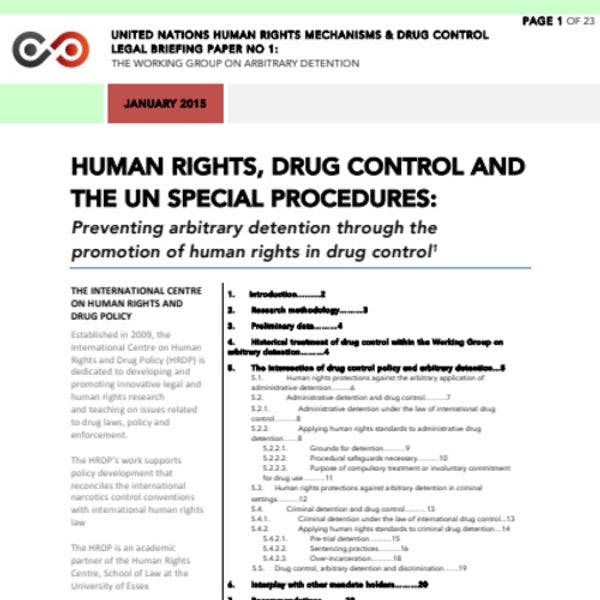Derechos humanos, control de drogas y procedimientos especiales de la ONU: cómo evitar las detenciones arbitrarias mediante el fomento de los derechos humanos en el ámbito del control de drogas
Esta publicación tiene por objetivo avanzar en el desarrollo normativo de los derechos humanos y el control de drogas mediante la elaboración de informes temáticos colaborativos e individuales. Más información, en inglés, está disponible abajo.
Suscríbase a las Alertas mensuales del IDPC para recibir información sobre cuestiones relacionadas con políticas sobre drogas.
The UN drug control bodies rarely mention human rights, while the UN human rights mechanisms rarely mention drug control. In effect, the two speak different languages and hold different priorities.
Research underway at the International Centre on Human Rights and Drug Policy reveals that the historical treatment of drug control issues within the special procedures system is insufficient to have an impact on current drug control policy and practice. Reporting by mandate holders on drug control has been scattered and rarely collaborative, despite the numerous intersections drug control issues present across the mandates. As the special procedures develop their programme of work for the coming year, they have an important opportunity to consider ways in which coordination across the mandates can enhance the promotion and protection of human rights while countering the world drug problem—both to have an impact on policy-making and to close the normative gaps between the two legal regimes.
Ways in which the special procedures can organise their work to such ends should include the following:
- Contribute to the development of a joint special procedures statement for submission to the UN General Assembly Special Session on Drugs in 2016. A UN General Assembly Special Session on Drugs scheduled for mid-2016 is an important opportunity for the special procedures to have an impact on the drug policy debate, and ensure that human rights is rooted firmly at the centre of reforms moving forward.
- Advance the normative development of human rights and drug control through collaborative and individual thematic reporting on the promotion and protection of human rights while countering the world drug problem. The normative gaps highlighted in this research present numerous opportunities for mandate holders to develop lines of inquiry within their individual work and through collaborative reporting. This can include: an analysis of normative gaps; suggestions for standard setting measures that target stakeholders responding to the world drug problem, and; promoting the issue as a thematic human rights concern within the broader UN human rights mechanisms.
Keep up-to-date with drug policy developments by subscribing to the IDPC Monthly Alert.
